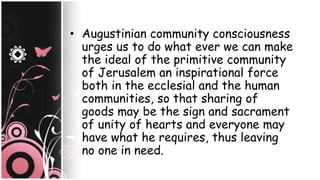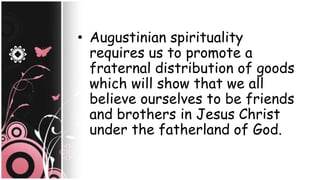Augustinian Values - Common good
- 1. Common Good Prepared by: Jonah Lea A├▒es Jan Pauline Rosal Ylyssa Marie Tolentino Ma. Ynah Rose Soriano
- 3. Augustinian Rule 7,2 ŌĆ£The degree of which you are concerned for the common good (rem communem) rather than for your own, is the criterion by which you can judge how much progress you made.ŌĆØ
- 4. Common Good ŌĆó The sum total of social conditions which allow people, either as groups or as individuals to reach their fulfilment more fully and more easily.
- 5. 3 essential elements ŌĆó The respect for the person as such; ŌĆó The social well-being and development of the group to which the person belongs; ŌĆó Peace which is the stability and security of the just order.
- 6. Lucan description of the Jerusalem community: The community of believers was of one heart and one mind and no one claimed that any of his own, but they had everything in common. . . There was no needy person among them, for those who owned property or houses would sell the, bring the proceeds of the sale and put them at the feet of the apostles and they were distributed to each according to need.
- 7. ŌĆó Augustinian community consciousness urges us to do what ever we can make the ideal of the primitive community of Jerusalem an inspirational force both in the ecclesial and the human communities, so that sharing of goods may be the sign and sacrament of unity of hearts and everyone may have what he requires, thus leaving no one in need.
- 8. ŌĆó Augustinian spirituality requires us to promote a fraternal distribution of goods which will show that we all believe ourselves to be friends and brothers in Jesus Christ under the fatherland of God.
- 9. Those who desire to have an Augustinian mode presence in the world takes as their specific apostolate making unity and peace a reality in the Church and in human society: ŌĆó This requires us to rid ourselves to others of narrowness and selfishness, and become attuned to a broader social love, joining ourselves to others in such wise that we may have only ŌĆ£one mind, the mind of Christ.ŌĆØ
- 10. ŌĆó Christian formation in Augustinian values, therefore, cannot prescind from an attitude that takes the common good seriously. Love, when it is true, is always directed away from oneself; it is trancendent.
- 11. The two-fold commandment of love translate into working for the common good; working for the common good is service.
- 12. THE END . . .












